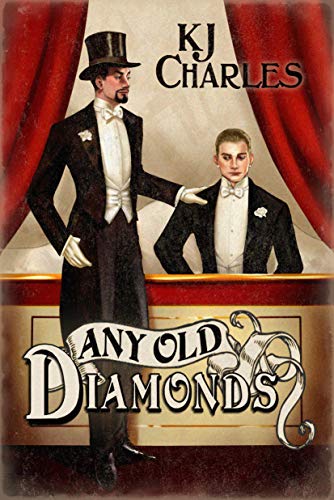He was going to commit a betrayal. Jerry was absolutely right about that. The months of lies were going to reach a culmination in Castle Speight, the trap he'd helped build would be sprung. He'd embarked on this path certain in his soul that it didn't matter what he did so long as his goal was clear, his heart pure. The lie of that had become clear weeks ago. Jerry was right. If he did this, he wouldn't be able to forgive himself. It would be unforgivable. [loc. 1981]Alec Pyne, a penniless illustrator, is in need of the Lilywhite Boys -- a pair of notorious jewel thieves, Jerry Crozier and Templeton Lane. For Alec did not always starve in a garret: he is Lord Alexander Pyne-ffoulkes, the youngest son of the monstrous Duke of Ilvar, and he wants to strike a blow against his father. A blow for his dead sister Cara (who the Duke wouldn't help in her last illness) and his dead mother, who died conveniently just as the Duke was falling in love with the woman he subsequently married. There is a priceless diamond parure, due to be gifted by the Duke to his Duchess on the occasion of their wedding anniversary. Alec tells Jerry that the proceeds will make a nice dowry for his surviving sister, Lady Annabel. And he, Alec, can get the thieves into Castle Speight ('the locals call it Castle Spite') if he pretends to crave reconciliation.
Jerry may only be pretending to be Lord Alexander's new best friend: but the pull he exerts over Alec is magnetic, and Alec -- for the first time in his life -- finds himself in a relationship where he can ask for what he wants, and receive it. Jerry (whose background is not dwelt upon for the majority of the book) is an astute observer and affects a cheerful nonchalance which conceals any emotions he may be experiencing. Alec, it must be said, does not exhibit much talent for subterfuge, though he does manage to treat Jerry as a friend rather than a lover.
And this is where the novel didn't work for me. Only read on if you don't mind spoilers. ... Alec does have a talent for subterfuge: there are important details he hasn't shared with Jerry, such as the involvement of Susan Lazarus (last seen as a snotty pre-teen in An Unnatural Vice, and now a successful female detective in her mid-thirties). Alec, sadly, didn't quite convince me as an unreliable narrator: there wasn't enough doubt or foreshadowing to signal that something was amiss. (Even on a reread, there are only the vaguest hints.) The quotation at the top of this review is about as explicit as it gets. It didn't ruin the book, or anything, but I found myself wrong-footed and wondering what else I had missed -- not just about Alec but about the others. The problem is that KJ Charles has set the bar very high, and this didn't feel as smooth as her usual work.
It is still a delightful book. The gradual cracking of Jerry's facade, Alec's increasing confidence, the appearances of characters from the 'Sins of the Cities' books (Greta! Susan! And, from Susan, a report on the relationship between Justin Lazarus and Nathaniel Roy!), the deftly-drawn family tensions, Alec's true passion for his art ... all drew me in. Not every character has a happy finale -- Band Sinister spoilt me, a bit, with its kindness towards the horrid aunt -- but the overall mood is one of contentment and closure. And possibility.
I'm looking forward to the next in the series. I shall be reading very carefully ...

No comments:
Post a Comment